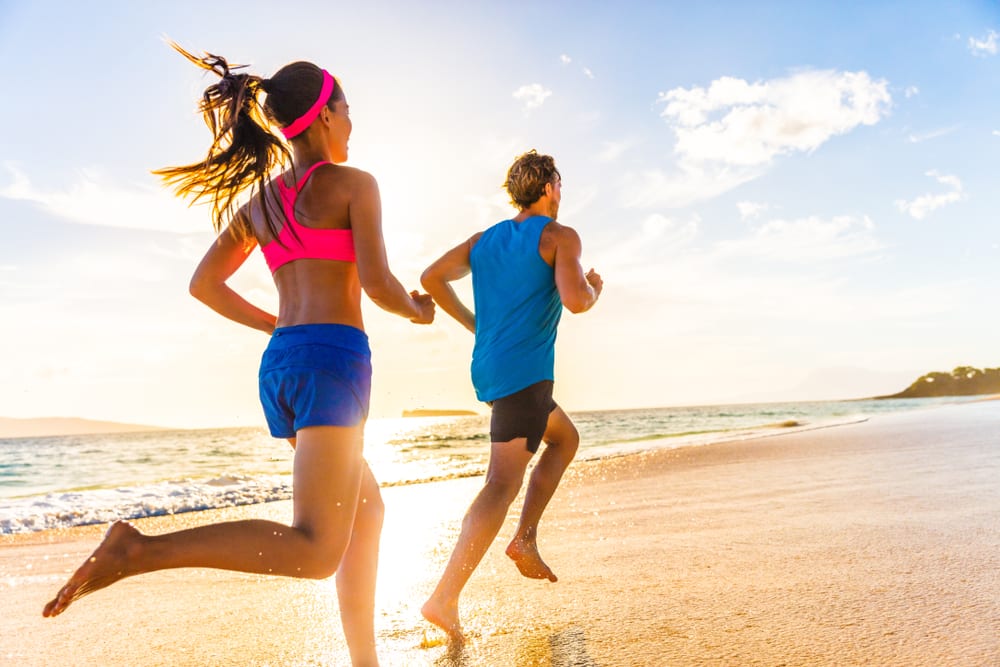I’m sure you’re familiar with the thought: Vacation at last! You’ve probably been looking forward to the upcoming summer break all year. When the time finally comes, however, strength athletes and athletes in particular are plagued by great concerns: Will the time-out possibly have a negative effect on their condition and lead to muscle loss? Don’t worry: Here you will find helpful tips on how to relax in the best possible way during your holiday and still counteract muscle loss.
1. Don’t let the fear of becoming unfit rule you
Probably the most important tip at this point is not to let fear and worry rule you. After all, as the name suggests, a relaxing holiday is primarily for relaxation. So it’s okay if you decide to take a complete break of one to two weeks. Immediately afterwards, you can start training again fully motivated. According to information from IKK Classic , such a break from training has its advantages: During this time, the muscles, tendons and ligaments can regenerate. And: Even if you take a break from training, your muscles don’t break down today until tomorrow. It takes up to four weeks before such muscle loss even begins. Even if you lose muscle strength, you can easily build it up again after your return home thanks to the “memory effect”.
2. Plan active recovery periods
If you are against taking a complete break from training, you can integrate exercises into your vacation. It is advisable to find out about the training opportunities on site at an early stage. In the event that there is no gym or training facility available in the hotel, you do not have to do without fitness. Rather, you can still keep fit with a little creativity and ingenuity:
- You can also stay fit on holiday through exercise. You don’t necessarily need devices here. Instead, you have the option to do a workout with only your own body weight. Tried and tested exercises such as “push-ups”, “squats” and “pull-ups” are already a good basis for protecting muscle mass.
- If you can’t or don’t want to travel without equipment, then a small dumbbell set or a few fascia rollers are suitable for the holiday, which massage the muscles after training and prevent injuries. These are ideal for training on holiday – and they also fit perfectly in your hand luggage.
- In order to actively relax, there are also other, “popular” sports on site during your holiday – depending on the respective destination. This can be, for example, swimming training or beach volleyball or jogging.
- In terms of intervals, we recommend a training day and then a day off for ambitious athletes. This results in two to three times a week of training, which lasts between 45 and 60 minutes.
3. Eat a healthy and protein-rich diet

How nice it would be to feast properly several times on holiday. Of course, there’s nothing wrong with a little lazing around – but at least when it comes to calories, you shouldn’t overdo it. Because due to unexpected calorie traps on vacation , you will quickly have a plus on the scales at home. Buffets in particular are treacherous, as you quickly lose track of things or get cravings due to the multifaceted offers. You can prevent unbridled feasting by setting a food limit from the start. It would be even better if you ate healthily on vacation, at least most days. In addition to high-calorie dishes, many hotels and resorts offer salad plates or packed lunches to take away. If you want calories, then “good” carbohydrate and protein sources will do the trick. For breakfast, you could fill up well with oatmeal muesli or unsweetened fruit salad. At lunchtime, pasta, rice or potato dishes offer many carbohydrates, while fish is protein-rich. In the evening, you should reach for protein-rich sources such as meat or fish with vegetables. If you get hungry in between, just grab a protein drink or a protein bar from your stash.
By the way: Even if the temptation is great on vacation, you should avoid alcohol as much as possible. A festival holiday with beer is absolutely suitable for destroying the training progress. This is due to the fact that alcohol inhibits muscle building and dehydrates the body. In addition, after drinking beer, the organism releases hormones such as testosterone or estrogen, which contribute to a worse figure.
4. Take the right supplements on vacation
During a trip, it is not wrong to pay attention to a certain basic supplementation. On average, experts recommend 1.5 to two grams of protein per body weight. This is hardly possible with a normal diet alone, which is why supplements help.
Pack a shaker in your suitcase and provide yourself with the nutrients you take in everyday life. Glutamines are important, as they stimulate blood circulation and protect your muscles from the “catabolic phase” defined by the health dictionary during energy metabolism. Amino acids such as BCAAs are also useful because they inhibit the breakdown of muscle proteins. Protein bars are practical for a small snack in between, and protein powder is also useful for larger dosages. However, it is better to carry them abroad in their original packaging. In many places, customs do not like it when tourists carry unknown powders or liquids.
5. Mindfully get back into training
After the homecoming is before the homecoming? Not quite! After a temporary abstinence from training, you will probably feel a bit weakened at first. Nevertheless, the recovery break has only a minimal effect on your strength levels. After just a few training sessions, you will find your way back to your “old strength”. In order for this to succeed, you should first approach the exercises in a relaxed manner. Use somewhat lightweight equipment at first. This way, you’ll allow for more increases and allow your body to slowly go back to the limit. Never go back to 100 percent after a long break, injury or illness. If you do, you risk injury and possibly a “muscle shock” that leads to insanely uncomfortable muscle soreness. Apart from that, the fear of losing strength due to the break is unfounded. As already mentioned, the so-called “muscle memory effect” exists. Your muscles find their way back to their old shape, as they have “stored” old training states and react quickly.
If you also travel a lot for work, you don’t have to miss out on fitness. Instead, try to include the sport in your planning from the beginning. And: Your health-promoting routines also have their place when traveling.


